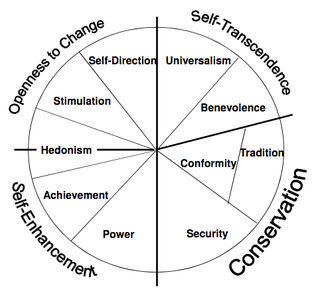Motivation
The Role of Values In Psychotherapy
18 values to consider in one's own life.
Posted November 22, 2021 Reviewed by Kaja Perina
Key points
- A value is acquired over time based on education, culture, and experience.
- There are several scientific scales to measure values.
- Exploring a client's value system during therapy is helpful for insight and to establish rapport.
- Socialization instills cultural values that are then accepted or rejected over a person's lifetime.

Therapy often focuses upon a presenting problem or a current situation consistent with past harmful conditions. You put up with it, but it gets old. Then something negative happens again, and you want it to stop or to better control it. Something has to change. You call a therapist.
The initial call and consultation include life history, current events, poor client choices, values, the environment, life cycle changes, or disruptive social systems. The first few sessions define therapeutic goals and the triggers that cause the presenting problems.
Value assessment usually comes during and prior to the end of therapy.
Therapy continues at its own pace. Every client is different. From time to time, after I work with a client, I need (and they inquire) about a more holistic approach best described as examining values. Society determines values linked to morality, ethics, codes of conduct, law, theology, and (cultural) ideologies.
The elucidation of values is not for everyone and can be tainted, subjective and interpretive. The $64,000 question is the best way to determine values without making the exercise too abstract. Here is my list and what I do if so warranted.
An informal measurement of a client's values: Instructions: Order 1-18, then add 0-100 to each item. Discuss.
A comfortable life
An exciting life
A sense of accomplishment
A world at peace
A world of beauty
Equality
Family security
Freedom
Inner harmony
Mature love
National security
Pleasure
Salvation
Self-respect
Social recognition
True friendship
The client first ranks the 18 items 1-18. Next, we start with "1," and I ask, "Although "1" is your most important value, how much of it do you have?" This ranking (1-18) times Intensity (0-100) is always the "fun" part.
A value might be paramount (rated #1) but have very little of it, like "Family Life." The form generates an open-ended discussion as to possible new goals in therapy.
The client makes a series of "value judgments" 0-100, drawing onto the paper, filling in a bar graph. I repeat the same question and answer 2-18, generating a value profile (the black filled in portions) if held horizontally.
If there is a large gap between the rank of a value and its execution (intensity), it becomes a new therapeutic issue depending on if the client is open to its discussion.
The open-ended interview
This therapeutic exercise becomes an open-ended interview raising issues not otherwise discussed or placed on the back burner.
I usually always find the results startling. For example, a value like "Freedom" that Americans take for granted is often ranked last, since like air is invisible until a dictatorship.
Why? We take many inherited or grandfathered values for granted. Freedom came with being born an American citizen. And the rank and intensity of a value change over time. If I took this questionnaire at age 20, it would have a different profile than at age 60, and if I moved to a foreign country, the ranking and intensity would probably change
This informal value questionnaire is used with high-functioning individuals interested in exploring personal philosophy after a very positive therapeutic relationship had been established. It's fun and instructive and tends to round out therapy before termination.
Common core values
A value refers to the relative importance that an individual places on an item, idea, person that is part of their life. These feelings are unique to the individual. The human value system serves self-exploration, self-enhancement, and self-recognition.
Mature emotional relationships often share common core values. Higher-order ideals emerge over time within a relationship, society, or work environment, and values change based on formal education and current events.
Values are tied to ethics and morals; they guide our judgment and prepare us to choose actions according to their consequences.
Values are deeply-held views that act as guiding principles for individual and organizational decision-making. Cultural values are the broad goals that members of a social institution pursue, since they justify individual actions in pursuit of value goals.
Cultural values thus play an essential role in the the way that social institutions function by sanctioning which attitudes and behavior are normative. In the organizational context, the broad goals that members are expected and encouraged to pursue make up the cultural values of that organization.
The (Schwartz) Portrait Values Questionnaire (PVQ)
The study of values has been formalized. In research, psychology's well-known values model is The Portrait Values Questionnaire (PVQ), based on Solomon Schwartz's theory of values.
Self-directional values – define our goals and ambitions in life.
Stimulative values – that provide the energy and vigor to move ahead for accomplishing the aspirations.
Hedonistic values – operate on the pleasure principle and instant need gratification.
Achievement values – that define personal success and competence.
Power values – come with societal norms, control, and personal resources.
Security values – including personal safety, harmony, interpersonal relationships, and self-control.
Conformity values – that operate through agreeableness to societal norms and standards.
Traditional values – involving respect, community support, commitment, and acceptance of customs and culture.
Benevolent values are tied in with preserving and enhancing the welfare of self and others close to us.
Universal values encompass appreciation, tolerance, and general acceptance of the nature of things around us.
In serious relationships, we tend to like or love others with similar values. In real life, to determine value structure requires many months of talking and observing. Therapy accelerates this process.
You can't list or assert values on a resume. The odd thing about values is that they are not listed on your resume. They are subjectively determined and dissected after hiring as a factor in your continued employment.
References
Solomon, Schwartz, S. (2012) An Overview of the Theory of Basic Values. Online Readings in Psychology and Culture International Association for Cross-Cultural Psychology. 2(1).
Osbeck, L. (2019) Values in Psychological Science.: Reimagining Epistimic Priorities At A New Frontier. Cambridge University Press. Cambridge.




